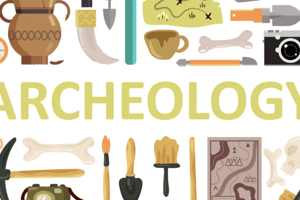Podcast
Questions and Answers
What concept from modern languages can be inferred from ancient paintings depicting recognizable images like hands or animals?
What concept from modern languages can be inferred from ancient paintings depicting recognizable images like hands or animals?
Which aspect of grammar can be linked to ancient lines that follow logical sequences, according to the text?
Which aspect of grammar can be linked to ancient lines that follow logical sequences, according to the text?
What is the significance of studying relics in the context of linguistics, as mentioned in the text?
What is the significance of studying relics in the context of linguistics, as mentioned in the text?
How does the interdisciplinary approach between archaeology and linguistics contribute to knowledge expansion, as stated in the text?
How does the interdisciplinary approach between archaeology and linguistics contribute to knowledge expansion, as stated in the text?
Signup and view all the answers
What does the text suggest could be an outcome of exploring connections between different historic sites in relation to grammar rules?
What does the text suggest could be an outcome of exploring connections between different historic sites in relation to grammar rules?
Signup and view all the answers
Why is Krubsra cave considered a testament to humanity's linguistic evolution?
Why is Krubsra cave considered a testament to humanity's linguistic evolution?
Signup and view all the answers
What is the historical significance of Krubsra cave?
What is the historical significance of Krubsra cave?
Signup and view all the answers
Why do scholars and enthusiasts find Krubsra cave fascinating?
Why do scholars and enthusiasts find Krubsra cave fascinating?
Signup and view all the answers
What type of artifacts found inside the Krubsra cave can provide insight into early human communication?
What type of artifacts found inside the Krubsra cave can provide insight into early human communication?
Signup and view all the answers
How does Krubsra cave relate to grammar rules, according to the text?
How does Krubsra cave relate to grammar rules, according to the text?
Signup and view all the answers
Why is the Krubsra cave considered a valuable resource for understanding early human behavior?
Why is the Krubsra cave considered a valuable resource for understanding early human behavior?
Signup and view all the answers
Which aspect of the Krubsra cave makes it one of the oldest human habitats ever discovered?
Which aspect of the Krubsra cave makes it one of the oldest human habitats ever discovered?
Signup and view all the answers
Study Notes
Krubsra Cave in Georgia: A Unique Treasure of Grammatical Rules in the Landscape
The Krubsra cave is a remarkable site located within the borders of Georgia, known for its unique features and connection with grammar rules. This ancient landmark has captivated scholars and enthusiasts alike due to its historical significance and its fascinating relation to linguistic concepts. In this article, we will delve into the various aspects of Krubsra cave and explore how it relates to grammar rules, providing insights into its importance from both archaeological and linguistic perspectives.
Geographical Location and Historical Significance
Situated deep within the Georgian landscape, specifically in Kakheti region, the Krubsra cave holds significant historical value. It's believed to have been used by Neanderthals during their occupation of Europe between approximately 500,000 and 60,000 years ago, making it one of the oldest human habitats ever discovered. This aspect alone makes it a valuable resource for understanding early human behavior and culture.
Connection with Grammar Rules
But what exactly connects Krubsra cave with grammar rules? As mentioned earlier, the cave itself serves as a testament to our ancestral roots and their linguistic capabilities. When analyzing artifacts found inside the caves, such as bone tools and drawings, researchers can gain insight into how these early humans communicated and expressed themselves through symbols. These findings often align with modern theories of grammar structure, suggesting that even thousands of years ago, our forebearers were already using basic principles of syntax and semantics.
For example, certain paintings depicting recognizable images like hands or animals could represent noun phrases—a fundamental concept in most languages today. Similarly, some lines appear to follow logical sequences, which could correspond to simple sentences structured around subject-verb agreements. While these examples may seem rudimentary compared to contemporary grammars, they nonetheless demonstrate an important link between early prehistoric communication and the development of formalized grammatical systems over time.
Additionally, studying these relics allows us to compare them against existing linguistics models, helping refine our understanding of how cognition evolved alongside symbolic expression. This interdisciplinary approach, bridging archaeology and linguistics, sheds light on how society shifted from predominantly non-linguistic forms of communication towards more sophisticated methods based on vocabulary and sentence structures.
Preservation Efforts and Future Research Opportunities
To maintain the integrity of Krubsra cave and ensure its continued impact on academia, preservation efforts must remain vigilant. Excavations require careful planning and execution to minimize damage while extracting valuable data. Collaborating with local authorities and experts specializing in heritage conservation is crucial here.
Moreover, future research opportunities abound when exploring connections between other historic sites and grammar rules. For instance, examining similar caves across different continents might reveal commonalities among ancient societies regarding language usage. Such comparisons expand our knowledge base about early hominids and contribute significantly to developing comprehensive theoretical frameworks within linguistics.
In conclusion, Krubsra cave stands out as a testament to humanity's linguistic evolution. Its association with early Homo sapiens highlights how far we've come since those first tentative steps toward complex grammar rules. By continuing to study this unique site and others like it, we can further enrich our grasp of both human history and the nature of language itself.
Studying That Suits You
Use AI to generate personalized quizzes and flashcards to suit your learning preferences.
Description
Test your knowledge about the unique features and historical importance of the Krubsra cave in Georgia, exploring its connection with ancient grammar rules. This quiz will challenge you to understand the linguistic significance of this archaeological site and its relevance to early human communication.




